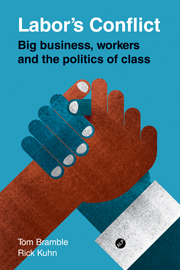Book contents
- Frontmatter
- Contents
- Preface
- Introduction
- 1 Labor's love's lost?
- 2 In the beginning: Labor's first quarter century
- 3 Between the Wars
- 4 Hot war, cold war, split
- 5 Labor after 70 years
- 6 The Whitlam era
- 7 Economic rationalism under Hawke and Keating
- 8 Labor in the wilderness
- 9 The Rudd–Gillard government
- 10 The Labor Party today: what's left
- Notes
- Index
10 - The Labor Party today: what's left
Published online by Cambridge University Press: 10 January 2011
- Frontmatter
- Contents
- Preface
- Introduction
- 1 Labor's love's lost?
- 2 In the beginning: Labor's first quarter century
- 3 Between the Wars
- 4 Hot war, cold war, split
- 5 Labor after 70 years
- 6 The Whitlam era
- 7 Economic rationalism under Hawke and Keating
- 8 Labor in the wilderness
- 9 The Rudd–Gillard government
- 10 The Labor Party today: what's left
- Notes
- Index
Summary
In this book we have argued that the Australian Labor Party can best be understood as a capitalist workers' party, working class in its supporters and union origins, capitalist in the policies that it has pursued. In chapter 5 we reviewed the material constitution of the ALP as it stood 70 years after its formation. We concluded that the party was still very much a capitalist workers' party at that time, but, alongside a fundamental continuity, there were also changes. Over the following 50 years further major changes have become apparent. The Party is obviously much older and has greater experience of holding office and, as a result, has become much more integrated into Australian capitalism.
These changes have to be situated within changes in the broader political economy. Capital itself has undergone substantial restructuring. The competitiveness and viability of Australian capitalism today depend much more on closer integration with international flows of finance and production than was the case five decades ago. Most importantly, the end of the postwar global boom in the early 1970s has affected the long term economic dynamism of Australian capitalism. Labor's approach to managing the economy has contributed and adjusted to these changes. Furthermore, the working class is more urban and larger than ever before. White collar workers are now a larger proportion of the working class, as industries such as education, hospitality, tourism, retail, and banking and finance have become much more significant employers. Union coverage has slumped, as has union militancy.
- Type
- Chapter
- Information
- Labor's ConflictBig Business, Workers and the Politics of Class, pp. 168 - 193Publisher: Cambridge University PressPrint publication year: 2010



